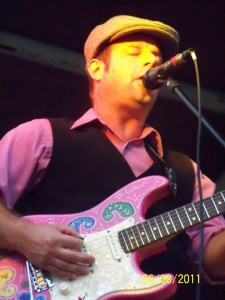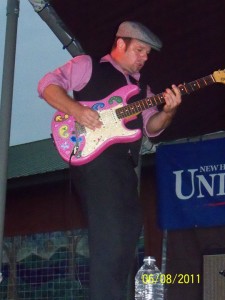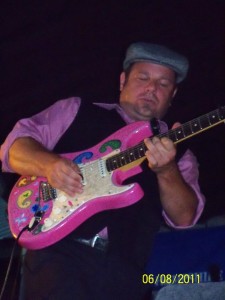
 Arthur James is gearing up for his trip to Memphis to compete in the International Blues Competition. His first step, since winning the Granite State Blues Society’s blues challenge last June, will be a fundraiser on January 20th at the VFW hall in Milford. Funds will be used to defray the costs of traveling down to the Beale Street clubs where the multi-night contests will take place.
Arthur James is gearing up for his trip to Memphis to compete in the International Blues Competition. His first step, since winning the Granite State Blues Society’s blues challenge last June, will be a fundraiser on January 20th at the VFW hall in Milford. Funds will be used to defray the costs of traveling down to the Beale Street clubs where the multi-night contests will take place.
“I’ve been a blues man for most of my life,” James said. “I relocated to New Hampshire in 1990. I’ve been trying to pursue something along the lines of a musical career. I still don’t call myself a full time musician because I still have a day job. Because I actually like a roof over my head.”
James won the Granite State Blues Challenge last year with his band Arthur James And Northbound. He won last June as a solo performer. GSBS doesn’t allow artists to compete in the same category in which they already won, a standard rule for most blues societies. This year, James will be competing in the solo/duo competition. The RBK Project will represent the Granite State Blues Society in the band competition. The IBC in Memphis takes from January 31st to February 4th.
James does not have any special preparations underway to enhance his set list for the Memphis solo artist competition. “I don’t believe in practicing or counting in songs,” he said. “I’ve never seen practice, I’ve never known practice to improve anyone’s memory as far as doing songs. I used to practice all the time with John and Roxanne(of Roxanne And The Voodoo Rockers) when I was drumming with them, then we would get to a gig and people would just forget the songs. I have a good long term memory. I don’t have any desire to go to a practice to make somebody feel comfortable about what they’re doing, only so that they could screw it up at a gig. I’ve done that with other drummers and bass players who’ve played with me. Either you’re gonna know the song or you’re not. Everybody needs to do their homework.”
“It’s one thing,” James continued, “if you’re doing The Beatles and you’re trying to recreate Sgt. Peppers where you have a million chord changes, and you’ve got a lot of people in the band. But if you’ve only got three or four people in a band, you should all be able to know your parts.”
James has a basic song list in the back of his head for the IBC, but he doesn’t want it etched in stone. He won’t really know what will work until he get there, based on how many contestants will be in each room and how much time he’ll have to play.
“The first two nights are quarter finals, and you’re guaranteed to play both nights of quarter finals,” James explained. “Last year was the first year that they had to expand the format to do more nights because there’s so many musicians from around the world that do the IBC competition. It never used to be quite as huge as it is now. It just keeps growing by leaps and bounds every year. There’s great musicians from all over the world who do it. So they added the extra night to make sure people get seen down there, heard.”
James said he will have roughly 80 competitors from around the world in his solo/duo category. When asked how he feels about competing with all those excellent blues musicians from around the world, James answered confidently: “That’s exactly why I’m going down there. I think it’s great. I always try to get there early. The first night they have an international showcase. They put on a huge show. It goes on for three to four hours. They’re usually 15 or 16 acts on there. It’s amazing. Some of them have an accent whey they sing. Their approaches are very unique.”
James enjoys the pre-show purely as a fan of the blues. “If you’re a blues musician, you’re pretty much a student of the blues for life,” he said. “It’s a very simple form of music. It’s a simple mathematical equation. But the variations of the math are limitless.”
James is excited about going back to Memphis this year. “Beale Street is only about four blocks long,” he said. “The whole city really is the home of the blues. You can say what you want about Chicago and Texas and all different places that have music scenes. But that’s what it is down there. It’s Elvis Presley’s place. But it really is the birth place of the blues. Each door you go to, they’re just the tiniest little bars, and the places are just packed with people who are there for the music. During the time that the competition is going on, its all blues music.”
James, though part of the rock and disco generation, became interested in blues after investigating the songwriting credits of blues covers on albums by The Beatles, Bob Dylan, Led Zeppelin, The Doors, and The Rolling Stones. “The best songs always were the blues songs on the album, to me. I’d always see the same names. I’d see Robert Johnson and Willie Dixon and Chester Burnett, McKinley Morganfield.”
“You listen to ‘Back Door Man’ and you go ‘Boy, that’s great.’ Then you go, ‘Well, they didn’t write that. I wonder what the original version sounds like.’ You seek out the original version. Then as soon as you hear the real blues guys doing it, and you’re just like, ‘Ah huh,’ and you’re hooked.”
James’ personal blues favorites goes back to the pioneers like Robert Johnson, Son House, and John Lee Hooker. James feels Hooker is a huge influence because James sees Hooker’s blues as deeper than anybody’s.
“They always talk about the Mississippi Delta blues and that’s where Robert Johnson and Son House and those kind of people came from. But I think what John Lee Hooker does is even more primal than that because he’s just staying on the one chord the entire time. He’ll sing the changes with his voice, but all he needs is that constant drone.”
James compares that drone to Indian music. “I hear Ravi Shankar’s music and that’s just traditional Indian raaga music and to me, it’s just as much blues as any of the blues your hear out of Chicago or Texas. To me, blues is a feeling. It is a mathematical equation as far as the instrumentation goes and the chord changes. But if you listen to Indian music it’s just a constant drone. And that’s all they were doing in the Mississippi Delta was just taking one note and you just keep thumping on it and it mesmerizes you. It takes you out of your body.”
James is a clever guy but still finds challenges in the simplest blues forms. “Math is the basis for everything,” he said. “I’m not a huge fan of math, per se. But the possibilities, to me, are endless. Any time I pick up a guitar or a drum set, any time I play music, there’s always something different. You never play a song exactly the same way twice. I don’t care if you play it note for note and you think you’re on perfect time beat for beat. There’s always some different variation. The string is a little bit out of tune. Maybe you’re out of connect with the time. The song always gets played a little bit different. And the fact that you get thrown in with different musicians a lot; if you go to a jam session and you play a song that you’ve played a million times, all of a sudden they’re doing something you’re not used to, and that makes you play differently, and you constantly adjust to it. It’s like big ocean.”
James has some concerns about the GSBS’s organizational ability. He didn’t have a lot of competition for his solo/duo category last June. “This year, there wasn’t that many people that signed up, based on the fact that the people who were running the whole sha-bang didn’t really notify people on time.”
How did James feel when he won last spring? “Vindicated,” he said. Over the years, James used to find out about various competitions around New Hampshire hosted by various organizations; but not until after they took place. He would know some of the participants, but he would always read about it in the newspapers days after it took place. If he had known, maybe he would’ve won one of these competitions years ago. “It would have been nice to know,” he said.
James plays up to 150 gigs every year. “People will say it is hard to get gigs, and it is hard,” he said. “But you have to be willing to adapt. Some musicians can’t quite figure out that they need to play some gigs as a solo performer. And that’s one of my fortes, being able to do that. I do solos, duos, and three-piece bands. I can always find a way to get into some club or bar.”
The GSBS fundraiser will take place January 20th at the VFW in Milford, New Hampshire at 7:30 p.m. James will start the event as a solo performer. Charlie Keating Band, a runner up this past June will do a set, and RBK Project will finish the show.


